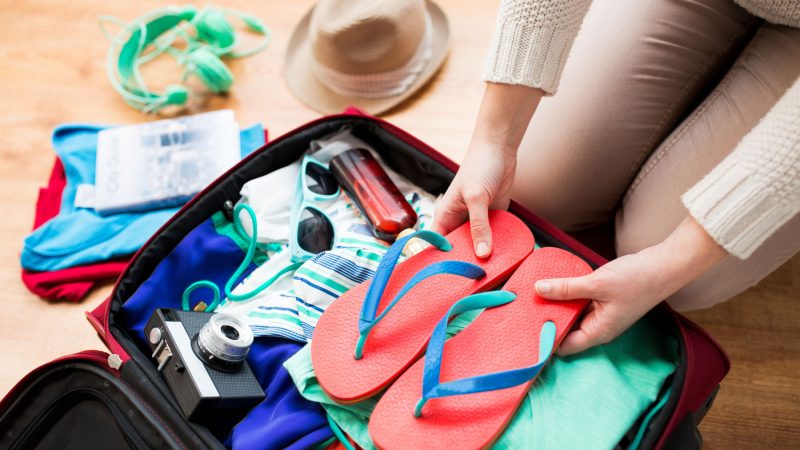
3 ways to avoid home catastrophes while you’re away on vacation
Call it the “Murphy’s Law of Home-Buying” if you will, but there’s a good chance that shortly after you move into your new home the water heater will die. It may trickle as it gives up the ghost or it may gush, but for some reason, these contraptions choose this time to self-destruct. We in the real estate industry see it a lot.
Then, there’s the “Murphy’s Law of Vacations.” Yes, we’re making these up, but they should be better known. This one says that “if anything can go wrong in your house while you’re on vacation, it will.”
Even the president of Quality Home Improvements, Inc., in Kingwood, Texas agrees. “If you’re going to have a leaking [main water] supply line, it’s going to happen while you’re away,” Fred Spaulding tells Popular Mechanic’s Brett Martin.
It’s summer vacation time, so let’s look at some ways to pay homage to Mr. Murphy’s key principle: always plan for worse-case scenarios.
- Getting back to that water main
Sure, most water main breaks occur in winter, when frigid weather freezes pipes. But, “Hot, dry weather can also take a toll; ground shifts and the increased volume and pressure can also stress water mains” cautions the experts at the Cape Fear Public Utility Authority.
Mains constructed of iron are the most conducive to leaking, and most of these water mains were installed in homes built before 1980. Iron cracks, especially with temperature changes.
Extreme temperatures aren’t the only things that may cause a leak in the water main. Soil erosion around the main may cause it to leak or break. Corroded pipes and those that are older than 60 years fail frequently and intrusion from construction work or homeowners (such as striking the main with a shovel) can also damage the water main.
It only takes a small leak to wreak havoc on your home. A leaking water tank in the attic can ruin whatever is in the room under it quickly, even from a small leak. Then there’s that water heater.
Prevent water damage while you’re away by closing the main supply valve to the home. The location of the shut-off valve depends a great deal on the type of home you live in. It could be in the basement, garage or a number of other places. Ask your plumber if you’re unsure of how to find it, or “ . . . look for your water meter, it should be nearby,” advises the Family Handyman. Visit his site to learn how to turn off the valve.
- Air conditioner: On or off?
Leave it on. Sure, it makes sense that you’ll save more money on your energy bill if you turn off the HVAC system before leaving town, but the money you save may eventually be spent to fix damage caused by the home overheating.
Air conditioning not only cools the air, but removes humidity from it as well. A hot home interior can cause condensation to form and that, in turn, can cause a rash of problems, according to the pros at Santa Fe Air Conditioning and Heating. These include warped wood floors, doors and furniture, peeling paint and mold. “For optimum comfort and for the health of your home, the humidity in your house should be no higher than 50%,” they say.
Set your programmable thermostat to 85 degrees for the duration of your vacation and to your favorite cooler temperature, set to kick in the day you are to return, or the evening before.
Manual thermostats, unfortunately, should also be turned up to 85 degrees while you’re away. Perhaps a neighbor can be talked into lowering the temperature before your homecoming so you don’t come home to an oven.
- Vacays mean unplugging – in more ways than one
Ok, so maybe you don’t consider a high power bill catastrophic, but some of us do – especially when we weren’t home to get the benefit of the power usage. So, if you’re among us, it’s time to unplug.
Still have a cable box for the TV? According to Mother Jones’ Kiera Butler, “The EPA estimates that your box setups use about 500 kilowatt-hours per year, as much electricity as your fridge.” While you may not be leaving town for a year (lucky you if you are), you should still unplug it before your vacation. No word, however, on how much power your Roku stick uses.
Don’t just put your computer to sleep while you’re gone. Unplug it completely. Monitor, router and modem too.
The bigger your TV is, the more power it gobbles, according to Butler. “Flat-screen TVs use about twice as much power as their smaller cathode-ray counterparts,” she claims.
Unplug game consoles, DVD and Blu-ray players as well. Hopefully you have all of your electronics on surge protector power strips so one switch will kill the power to all of them. If you won’t be taking your phone charger with you, unplug it. Do the same with small kitchen appliances, such as the microwave oven, coffee maker, food processor,
If your washer and dryer have digital displays, consider unplugging them as well.
Don’t forget the security measures you’ll need to take before you leave as well. Safewise offers a handy guide on its website.
Then, when all the preparations are complete, you’ll need a vacation from your vacation preparation!
Powered by WPeMatico




Recent Comments